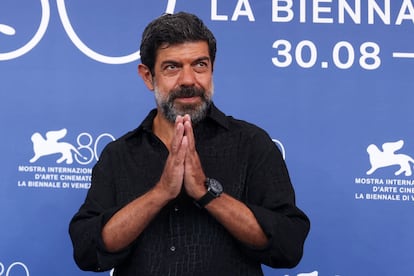The Venice Film Festival’s most unexpected controversy: Cultural appropriation, or why Enzo Ferrari speaks English
Well-known Italian actor Pierfrancesco Favino sparked a debate after he lamented that Michael Mann’s film chose Adam Driver to play Enzo Ferrari instead of a local performer

On the screen, Modena appears. There are bicycles under the porticoes, a plate of fettuccine in a trattoria and, of course, the world’s most famous red car, whose name is in the very title of the film. The movie even mentions the local soccer club, the “pride” of the region. All of these things are extremely Italian. So, why the hell does Enzo Ferrari speak English? Because of the creative freedom that each director and film can and should take, some would say. That’s what Michael Mann and the production team decided because it seemed best for Ferrari, period. But Pierfrancesco Favino, probably Italy’s most celebrated actor in recent years, has another explanation: “...cultural appropriation. I don’t understand why these kinds of movies are entrusted to foreign interpreters, [who are] removed from the stories’ real protagonists, starting with the exotic accent. [...] At another time, Gassman would have done it. Today, Adam Driver does it and nobody says anything,” he asserted this Saturday, at the press conference for Adagio, another film of his competing at the festival. With that, Favino set in motion the most unexpected controversy of the Mostra.
On Monday, criticism came for the other leading actor in Ferrari. “Penelope Cruz speaks with a Spanish accent trying to be Romagnola [from Emilia Romagna],[like] a sort of exorcist with several voices inside her,” declared director and actor Luca Barbareschi, at the premiere of his latest film, The Penitent. The director, who has worked as an actor and producer on Roman Polanski’s latest feature films, is also known in Italy for his political career as a right-wing deputy in Silvio Berlusconi’s party, as well as for a certain willingness to be controversial.
The festival knew that the actors’ and screenwriters’ strike against the big Hollywood studios and platforms would be a controversial issue at its 80th edition. It was also aware that inviting Luc Besson, Woody Allen and Roman Polanski, all linked with cases of alleged or proven sexual violence in different ways, would spark criticism. But surely no one foresaw the verbal battle that has garnered headlines and prompted questions from the Italian press for two days at the festival. Favino’s comments only lit the fuse. Since then, the debate has been raging, with arguments both for and against.
“I don’t understand why actors of this caliber [he was surrounded by Toni Servillo, Adriano Giannini or Valerio Mastandrea], not me, are not involved in these films. [...] If a Cuban can’t play a Mexican, why can an American play an Italian: Only here. It seems to me [to be] an attitude of contempt toward the Italian system; if these are the common rules, then let’s participate as well,” the actor stated. In passing, he recalled that Driver had also played Maurizio Gucci, in the Ridley Scott film in which other Hollywood actresses played the rest of the famous family, in English. And Favino has even described his movement as a “small battle.” That’s because the giant that is U.S. cinema, which already dominates the box office, does not gobble up European stories. It’s also because money, which is pushing for English-language films to facilitate distribution in more markets, makes more concessions to realism and authenticity. Incidentally, the actor also hints that a foreign [actor] and a super-production also increase the risk of more stereotypical portrayals.

Celebrities have continued to weigh in on the debate with opinions that fall on both sides. On Monday, Sofia Coppola, who was presenting her film Priscilla at the festival, said: “A director should be free to choose how and with whom to tell his story.” And Mads Mikkelsen, the star of Bastarden, another film competing at the Venice Film Festival, gave an interview with La Repubblica in which he said that he understood Favino, but pointed out another problem: the common practice of dubbing movies already puts countries like Italy, France and Spain at a disadvantage. And it detracts from the value and importance of defending the original language. Start by questioning that, the Danish actor observed. “I never understood why you do that. It’s crazy,” he said. On the other hand, Italian actors and filmmakers such as Pupi Avati and Monica Guerritore backed up their well-known colleague’s claim. According to La Repubblica, the latter argued: “They told me that if I gave the role of Anna Magnani to an American [actress], I would have conquered the global market, but only an Italian actress can play her.”
But Favino is wrong in at least one respect: the issue is not exclusively Italian. True, it did happen in The House of Gucci and in Luca, a Pixar animation with an Italian director and setting that was spoken in English. But the debate over cultural appropriation was already going on in Colombia. In recent years, two famous actors have played Pablo Escobar, neither of whom were Colombian. Many could not forgive Brazilian Wagner Moura for his strange cadence in the show Narcos. And the linguistic choice for Fernando León de Aranoa’s Loving Pablo was even more questionable: Javier Bardem played the drug trafficker, while Penélope Cruz went back and forth between Spanish and English in the film. The highly praised Chernobyl series had many merits, but fidelity to the original languages was not one of them; the show had no traces of Russian or Ukrainian. Moreover, this debate is not limited to cinema: Rosalía has been accused of culturally appropriating flamenco numerous times.
As the debate expands, it also faces its limits. For example, no one would think to question The Godfather. Actor Edoardo Pesce told La Repubblica that an actor from Palermo got angry because the former is not Sicilian but played the mafioso Giovanni Brusca anyway. “The dialect and the language are learned,” he insisted. That, oddly enough, brings Favino back into the picture. In the actor’s other film at the film festival, Comandante [Commander], he plays naval officer Salvatore Todaro. Born in Sicily, he lived in Tuscany. But the actor himself is extremely Roman. Moreover, Favino and the director, Edoardo de Angelis, decided to change his accent to one from another region: Veneto. Once again, two rights clashed. Creative freedom versus the right to get angry.
Sign up for our weekly newsletter to get more English-language news coverage from EL PAÍS USA Edition
Tu suscripción se está usando en otro dispositivo
¿Quieres añadir otro usuario a tu suscripción?
Si continúas leyendo en este dispositivo, no se podrá leer en el otro.
FlechaTu suscripción se está usando en otro dispositivo y solo puedes acceder a EL PAÍS desde un dispositivo a la vez.
Si quieres compartir tu cuenta, cambia tu suscripción a la modalidad Premium, así podrás añadir otro usuario. Cada uno accederá con su propia cuenta de email, lo que os permitirá personalizar vuestra experiencia en EL PAÍS.
¿Tienes una suscripción de empresa? Accede aquí para contratar más cuentas.
En el caso de no saber quién está usando tu cuenta, te recomendamos cambiar tu contraseña aquí.
Si decides continuar compartiendo tu cuenta, este mensaje se mostrará en tu dispositivo y en el de la otra persona que está usando tu cuenta de forma indefinida, afectando a tu experiencia de lectura. Puedes consultar aquí los términos y condiciones de la suscripción digital.









































